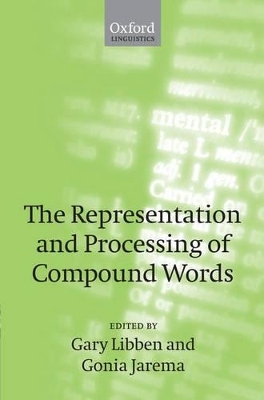
The Representation and Processing of Compound Words
Oxford University Press (Verlag)
978-0-19-928506-8 (ISBN)
This book presents new work on the psycholinguistics and neurolinguistics of compound words. It shows the insights this work offers on natural language processing and the relation between language, mind, and memory. Compounding is an easy and effective way to create and transfer meanings. By building new lexical items based on the meanings of existing items, compounds can usually be understood on first presentation, though - as, say, breadboard, cardboard, cupboard, and sandwich-board show - the rules governing the relations between the components' meanings are not always straightforward.
Compound words are segmentable into their constituent morphemes in much the same way as sentences can be divided into their constituent words: children and adults would not otherwise find them interpretable. But compound sequences may also be independent lexical items that can be retrieved for production as single entities and whose idiosyncratic meanings are stored in the mind. Compound words reflect the properties both of linguistic representation in the mind and of grammatical processing. They thus offer opportunities for investigating key aspects of the mental operations involved in language: for example, the interplay between storage and computation; the manner in which morphological and semantic factors impact on the nature of storage; and the way the mind's computational processes serve on-line language comprehension and production. This book explores the nature of these opportunities, assesses what is known, and considers what may yet be discovered and how.
Gary Libben is Professor of Linguistics and Director of the Centre for Comparative Psycholinguistics at the University of Alberta. He is the co-author, with M. Paradis, of The Assessment of Bilingual Aphasia (Erlbaum, 1987) and, with J. Archibald, of Research Perspectives on Second Language Acquisition (Copp, Clark, Pitman, 1995). Gonia Jarema is Professor of Linguistics at the University of Montreal and Director of the Mental Lexicon Laboratory at the Research Centre of the Institut Universitaire de Gériatrie de Montréal. She specializes in the psycho- and neurolinguistics of the mental lexicon from a cross-linguistic perspective. Gary Libben and Gonia Jarema have been guest editors of Brain and Language and Folia Linguistica. They have both served as Directors of the International Mental Lexicon Research Group of the Social Sciences and Humanities Research Council of Canada. They are Editors of the journal The Mental Lexicon.
1. Why Study Compound Processing? An Overview of the Issues ; 2. Compound Types ; 3. Compound Representation and Processing ; 4. The Neuropsychology of Compound Words ; 5. Preschool Children's Acquisition of Compounds ; 6. Doghouse/Chien-maison/Niche: Compounds in Bilinguals ; 7. Conceptual Combination: Implictions for the Mental Lexicon ; 8. Processing Chinese Compounds: A Survey of the Literature ; References ; Index
| Erscheint lt. Verlag | 10.12.2005 |
|---|---|
| Verlagsort | Oxford |
| Sprache | englisch |
| Maße | 163 x 243 mm |
| Gewicht | 540 g |
| Themenwelt | Geisteswissenschaften ► Psychologie ► Allgemeine Psychologie |
| Geisteswissenschaften ► Psychologie ► Verhaltenstherapie | |
| Geisteswissenschaften ► Sprach- / Literaturwissenschaft ► Sprachwissenschaft | |
| ISBN-10 | 0-19-928506-3 / 0199285063 |
| ISBN-13 | 978-0-19-928506-8 / 9780199285068 |
| Zustand | Neuware |
| Informationen gemäß Produktsicherheitsverordnung (GPSR) | |
| Haben Sie eine Frage zum Produkt? |
aus dem Bereich


